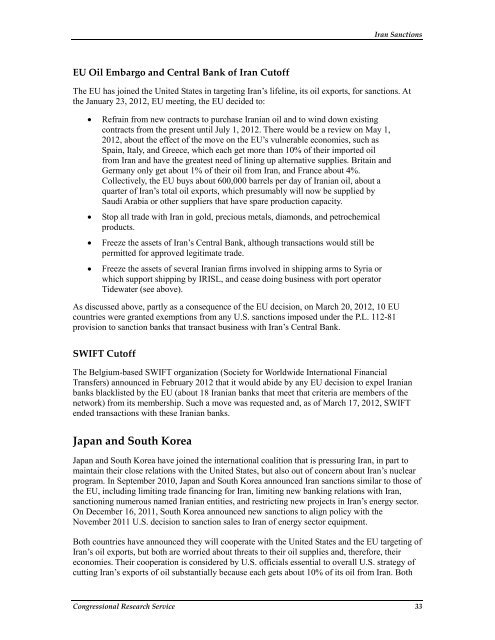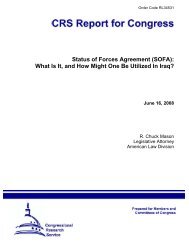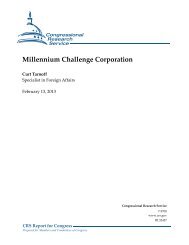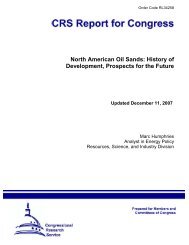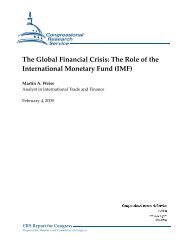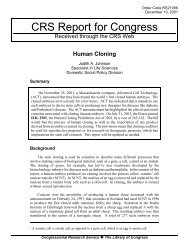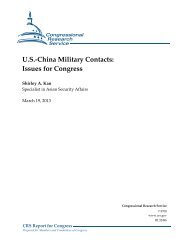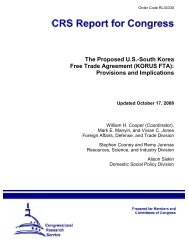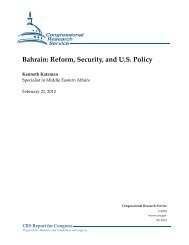Iran Sanctions - Foreign Press Centers
Iran Sanctions - Foreign Press Centers
Iran Sanctions - Foreign Press Centers
Create successful ePaper yourself
Turn your PDF publications into a flip-book with our unique Google optimized e-Paper software.
EU Oil Embargo and Central Bank of <strong>Iran</strong> Cutoff<br />
<strong>Iran</strong> <strong>Sanctions</strong><br />
The EU has joined the United States in targeting <strong>Iran</strong>’s lifeline, its oil exports, for sanctions. At<br />
the January 23, 2012, EU meeting, the EU decided to:<br />
• Refrain from new contracts to purchase <strong>Iran</strong>ian oil and to wind down existing<br />
contracts from the present until July 1, 2012. There would be a review on May 1,<br />
2012, about the effect of the move on the EU’s vulnerable economies, such as<br />
Spain, Italy, and Greece, which each get more than 10% of their imported oil<br />
from <strong>Iran</strong> and have the greatest need of lining up alternative supplies. Britain and<br />
Germany only get about 1% of their oil from <strong>Iran</strong>, and France about 4%.<br />
Collectively, the EU buys about 600,000 barrels per day of <strong>Iran</strong>ian oil, about a<br />
quarter of <strong>Iran</strong>’s total oil exports, which presumably will now be supplied by<br />
Saudi Arabia or other suppliers that have spare production capacity.<br />
• Stop all trade with <strong>Iran</strong> in gold, precious metals, diamonds, and petrochemical<br />
products.<br />
• Freeze the assets of <strong>Iran</strong>’s Central Bank, although transactions would still be<br />
permitted for approved legitimate trade.<br />
• Freeze the assets of several <strong>Iran</strong>ian firms involved in shipping arms to Syria or<br />
which support shipping by IRISL, and cease doing business with port operator<br />
Tidewater (see above).<br />
As discussed above, partly as a consequence of the EU decision, on March 20, 2012, 10 EU<br />
countries were granted exemptions from any U.S. sanctions imposed under the P.L. 112-81<br />
provision to sanction banks that transact business with <strong>Iran</strong>’s Central Bank.<br />
SWIFT Cutoff<br />
The Belgium-based SWIFT organization (Society for Worldwide International Financial<br />
Transfers) announced in February 2012 that it would abide by any EU decision to expel <strong>Iran</strong>ian<br />
banks blacklisted by the EU (about 18 <strong>Iran</strong>ian banks that meet that criteria are members of the<br />
network) from its membership. Such a move was requested and, as of March 17, 2012, SWIFT<br />
ended transactions with these <strong>Iran</strong>ian banks.<br />
Japan and South Korea<br />
Japan and South Korea have joined the international coalition that is pressuring <strong>Iran</strong>, in part to<br />
maintain their close relations with the United States, but also out of concern about <strong>Iran</strong>’s nuclear<br />
program. In September 2010, Japan and South Korea announced <strong>Iran</strong> sanctions similar to those of<br />
the EU, including limiting trade financing for <strong>Iran</strong>, limiting new banking relations with <strong>Iran</strong>,<br />
sanctioning numerous named <strong>Iran</strong>ian entities, and restricting new projects in <strong>Iran</strong>’s energy sector.<br />
On December 16, 2011, South Korea announced new sanctions to align policy with the<br />
November 2011 U.S. decision to sanction sales to <strong>Iran</strong> of energy sector equipment.<br />
Both countries have announced they will cooperate with the United States and the EU targeting of<br />
<strong>Iran</strong>’s oil exports, but both are worried about threats to their oil supplies and, therefore, their<br />
economies. Their cooperation is considered by U.S. officials essential to overall U.S. strategy of<br />
cutting <strong>Iran</strong>’s exports of oil substantially because each gets about 10% of its oil from <strong>Iran</strong>. Both<br />
Congressional Research Service 33


